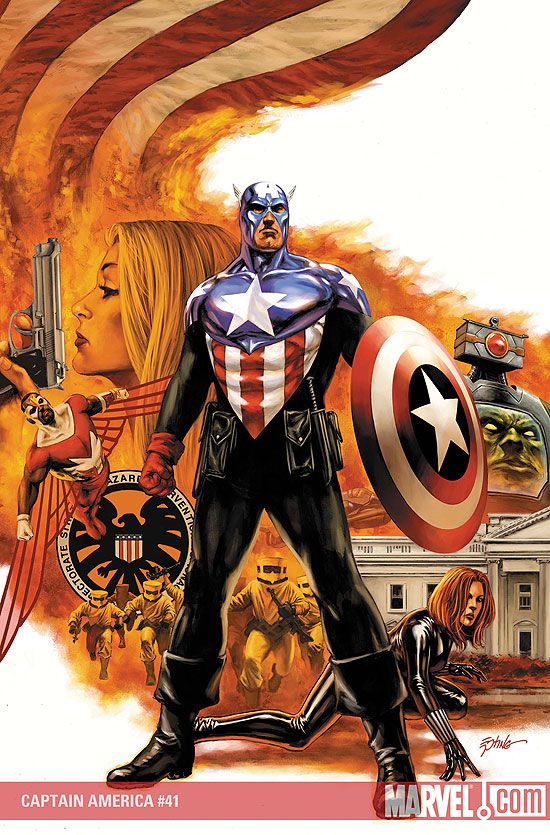"Captain America" #41 ends with the words "To Be Concluded. . ." What does that mean? Ed Brubaker has been telling one long story since issue #1, and although it's possible that he'll wrap it all up next issue, it's unlikely. He has too many red, white, and blue juggling balls in the air. Too many threads left tangled. Too many pieces of bacon in the frying pan. I could keep this metaphor thing going all day. But I can't see how he'd resolve everything in a single issue. So I'm going to assume that something -- one aspect of this intricately woven plot -- will reach its conclusion next issue, and because I'm enjoying this series so much, I won't even try to guess what Brubaker has prepared for us a month from now. I'll let him surprise me.
This issue is typical Brubaker "Captain America," by which I mean it's very good, jumps effectively from scene to scene, balances character moments with action, and works as a mini-masterpiece of serialized storytelling. I can't seem to give this comic more than four stars for a single issue, because each issue relies so much upon the whole of the series, but what a whole this is shaping up to be! I think it's safe to say that this series has been Ed Brubaker's best sustained work. "Criminal" might be better in small doses, but he's doing something in "Captain America" that points to what serialized superhero comics ought to be. He's developing subplots slowly, he's rotating characters in and out of the overall drama -- in this case the 1950s Captain America is the bait used to find the bad guys -- and he's pacing each issue to provide forward progress and end on a cliffhanger. It harkens back to the classic Marvel comics of old, when each issue would conclude with a shocking splash page, but Brubaker has the advantages of writing for a modern audience (which means he can take his time to develop things) and working with a consistent set of artists. Even the fill-in artists have maintained the look that was established in issue #1. Frank D'Armata continues to over-render the colors, and use white highlights garishly, but he is largely responsible for maintaining the consistent look here, and I appreciate that.
One of the things I like about Brubaker's approach here, besides his stylistic virtuosity, is the way he presents Captain America as a symbol of this country without getting political about it. This isn't the John Ney Rieber incarnation of the character, going after Al-Qaeda. This is a Captain America who jokes with the Falcon about playing cards for Euros and says he's "a realist" in "a capitalist world." This is a Captain America who wants to take care of personal problems and rescue someone who is important to him, but knows that leaping into action to defend a presidential candidate is more important. This is a Captain America who must uncover a complex plot involving the Red Skull, Arnim Zola, and corporate America. This is a Captain America who does all of these things, but is also an ex-Soviet assassin who was once the teenage partner of Steve Rogers in WWII. Brubaker's Cap contains multitudes.
"Captain America" is Marvel's best ongoing series right now, and for all the attention on the "Death of Captain America," it's been the life after the Death that has been the real treat to read.

